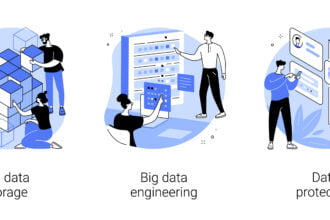Big data is changing the nature of online privacy in incredible ways. We have talked extensively about changes of online privacy due to advances in big data and ways people must adapt.
Millions of people fall victim to cybercrime every day. The FBI’s Internet Crime Complaint Center (IC3) reported that in 2019, they received 467,361 complaints from consumers and recorded approximately $3.5 billion in losses to business and individual victims. These numbers are increasing every day as cybercriminals use various tactics to access private data.
Some of the increasingly common online crimes and scams include extortion, non-payment/non-delivery scams, phishing, spoofing, business email compromise, and identity theft. With all these risks, how do you stay safe online?
Below are some ways to protect yourself against online threats in an age governed by big data and maintain a secure and safe web environment.
Use Two-Factor Authentication (2FA)
Two-factor authentication is essential as it verifies your identity by using at least two different forms of authentication. Today, many online services offer two-factor authentication, including Dropbox, Gmail, and Evernote, to improve account access security.
2FA requires you to prove your identity after logging in using your username and password. For instance, you would need to verify your identity by answering a security question or entering a code sent by text to your email or phone. Opt-in whenever 2FA is available to secure your Digital Identity. It may take an extra minute to log into your account, but it will prevent anyone from accessing your account and sensitive data.
Unique and Strong Passwords
Hackers often steal information by simply getting the combination of username and password from one source, and then trying the same combinations somewhere else. The best way to avoid data breaches is to use a unique and strong password. The simplest and best password should be easy to remember and hard for other people to crack.
It is better to use abbreviated passphrases or sentences than using a single word with symbols or numbers inserted. You can also use a password management app to help generate your passwords and store them for you. It can also assist in generating unique passwords for every one of your accounts online. Remember to change the passwords regularly.
Clear Your Cache
Your browser’s cache holds so much information about you, so you should never underestimate how vulnerable it is to a security breach. Your web history, saved cookies and saved searches could quickly point to your family information, personal data, and even your home address. To protect your information that may lurk in your web’s history, remember to delete the browser history and browser cookies regularly.
In Edge, Internet Explorer, Opera, Firefox, and Chrome, it is simple to delete this information by simply pressing Ctrl+Shift+Del, which brings up a dialog box that allows you to choose the elements of the browser data which you would like to clear. However, deleting the cookies might cause trouble on some websites, and you might lose any personalization applied. Fortunately, some browsers allow you to list favorite websites so you do not lose the cookies on those sites.
Keep Your Privacy Settings On
Advertisers always want to know more about you, and so do hackers. They gain a lot of information from your social media use and browsing history. However, you can take charge of your data. Mobile operating systems and web browsers have settings to protect your privacy while online.
Popular sites like Facebook also have privacy-upgrading settings available. These settings can sometimes be challenging to find because companies need your personal information for its marketing value. Ensure you always have privacy settings enabled to your preferences.
Is Online Security Important in the Age of Big Data?
Most definitely, yes! Big data has changed the cybersecurity landscape and led to more concerns about our privacy. The growing popularity of the internet makes it imperative for everyone to be more aware of online security. If you’re still wondering how you will protect yourself against online scams, simply treat online interactions as you would treat interactions with a stranger walking down the street. You need to safeguard your data more than ever.
That means you possibly wouldn’t lead them to your home address, hand them your credit card, or open anything they give you or expose that information through a data breach. The same rules will help you stay safe online.











